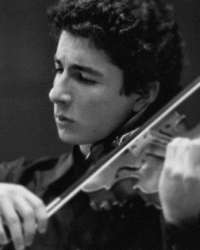French Conductor Makes English Orchestra Sound Russian
J. Sibelius, S. Kha |
The structure of orchestral concerts is hardly ever novel. Overture – Concerto – Symphony. Ever. Time. So creativity and interest are only to be found in the specific works that fill these prescribed slots. To place Britten’s Simple Symphony (op.4 – also on offer by the East Coast Chamber Orchestra on Friday, April 28 at 7:30 p.m. at the Terrace Theater - an ATTEND event) at the head of the evening was a nice gift from England for the London Philharmonic to bring the audience at the Kennedy Center Monday night. Under Yan Pascal Tortelier (not Kurt Masur who had to cancel, not Osmo Vänskä, Roberto Minczuk, Neeme Järvi who all got to take a turn replacing Kurt during the US tour) the LPO played this fun-thing with for string orchestra with the requisite humor, perhaps even irreverent attitude. The orchestra’s sound was extremely well defined, delineated: no fuzzy or muddled edges – only clear lines and a dry, big and resonant body of sound. The signs of expert craftsmanship.
 Concerto:
Concerto:Not replaced was Sergey Khachatryan who performed the Kachaturian Violin Concerto – the other concert next to the Sibelius with which he has made his name. This time he was playing the Huggins Stradivari, but that didn’t automatically lend him a big sound. Sweet, stuffy nosed and occasionally docile in tone, the performance was good, and especially so in the beginning of the second movement and the third movement. Despite not forcing himself unto the listener with overwhelming sound, he played with the intensity that the majority of the patrons remained awake during the (too damn long) slow movement. Then, thanks to Tortelier (whose cue was a jumping jack) and the LPO, they were yanked out of their dreams with the glorious, noisy, cheap bombast of the that movements finish. And even those who were wide awake were – literally – jolted and pushed back into their seats at the dry (all controlled force) attack of the orchestra that opens the Allegro Vivace. With jitter-vibrato (more a tremolo, really) Khachatryan continued his amiable but just-off performance. It was clear at all points that he has mastered the work, that his technical ability is never stretched in the least… but it also never quite caught fire. The intangible that makes the difference between an excellent performance and a great performance was utterly missing, leaving the challenging and furious parts of the finale just “impressive”. Aside, a violinist should not get his show stolen by the orchestra in this work. But that was the case here – even if it was mostly the LPO’s and Tortelier’s achievement as they knew how to work the edges and contrasts of the score. Excessive applause encouraged a Bach encore, the Adagio from the g-minor Sonata. One way to ruin a perfectly fine reputation. Maybe Khachatryan aimed for an ‘introverted, melodious’ reading – but the result was a wimpy, wishy-washy Bach indecisively played towards nowhere.
Symphony:
Tchaikovsky’s Symphony no.5 in that great, deep, ever continuous sound of the LPO was bold, broad and greatly enjoyable. Tortelier conducted in his characteristic style, reminding more of a swim-course instructor than maestro. The results put him beyond criticism, but he looks terribly goofy and can even distract from the action with his contortions.
Daniel Ginsberg, London Philharmonic Orchestra (Washington Post, March 29) |




















































